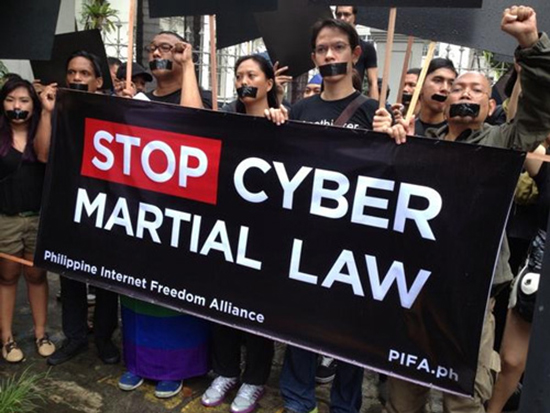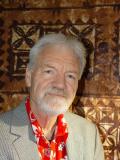
The campaign for media freedom in the Asia-Pacific region region continues to face opponents, such as parliamentarians in Timor-Leste this week. David Robie writes about the growing cyber threat to free speech and unfettered information.
ANALYSIS: A controversial law in the Philippines billed by critics as an “electronic martial law” that criminalises e-libel may now be mimicked in the Pacific.
The Supreme Court in Manila ruled in December 2012 to temporarily suspend this law and then extended it until further notice in February 2013. However, in February this year, the Supreme Court ruled that the law was indeed constitutional, “effectively expanding the country’s 80-year-old libel law into the digital domain”.
Now in Papua New Guinea the Peter O’Neill government has signaled an impending onslaught against stridently critical social media with a draft new cyber-crime law.
Under proposed legislation recently considered by the cabinet in Port Moresby, the National Information and Communication Technology Authority (NICTA) would be granted powers to act against individual attacks on social media.
The agency would be able to routinely monitor SIM cards with a “full biometric scan” and it would become illegal for people to use pseudonyms for social media postings.
Bloggers in Papua New Guinea are up in arms about the proposed legal powers.
Opposition Leader Belden Namah has described this development as “dangerous” for Papua New Guinea’s traditional freedom of speech. He says Prime Minister O’Neill should grow a thick skin.
Cybercrime law mirror
The proposed PNG legislation mirrors in some respects the Cybercrime Prevention Act in the Philippines where an offender can be imprisoned for up to 12 years without parole and the law is regarded by critics as a violation of Article 19 of the International Covenant on Civil and Political Rights.
Truth is not recognised as a defence.
Last month, the indictment of two journalists, Alan Morison and Chutima Sidasathian, for alleged criminal libel under a similar Computer Crime Act in Thailand “may spell doom” for the online news website Phuket Wan.
These developments have come as journalists are still struggling to regain a free press in post-coup Fiji with a nervous regime trying to restrict freedom of speech on all fronts with a general election approaching in September.
Instead of encouraging greater freedom of expression and plurality of media debate, Fiji’s Media Industry Development Authority (MIDA) recently imposed a new “chilling” factor by recently both accusing and condemning Fiji Television, the country’s oldest and most-established television broadcaster, of airing “hate speech”.
The station broadcast comments by a Tailevu high chief and politician that were condemned by the chairman of MIDA, Ashwin Raj, in a media conference as “unabashed racial vilification” against Indo-Fijians.
He called on freelance journalists in Fiji to be registered by MIDA and he criticised journalists for failing to learn from training courses.
Donor dependent
In the Pacific, media organisations themselves are too dependent on donors in the region for the limited training that does go on, and this makes them captive to the donors’ agendas.
Many view ventures as band-aid projects out of step with journalism training and education in Australia and New Zealand.
Australian Aid has contributed little to the main university-based journalism schools—the best hope for sustainable media training and education in the region.
But even the universities are under threat.
In Timor-Leste, on the cusp of Asia and the Pacific, there is severe criticism of media education and training strategies. Award-winning José Belo, arguably his country’s finest investigative journalist and president of the Timor-Leste Press Union, is highly critical of “wasted” journalism aid projects totalling more than US$5 million.
A “journalism in transition” conference in Dili last October attempted to strengthen the self-regulatory status of the news industry “in response to the so-called international aid, particularly from the United States and Australia, which has been misused in the name of journalism in this country”.
The good news was that there was a united stand on a new code of ethics.
‘Information hero’
Belo was named on the Paris-based Reporters Sans Frontières list of 100 “information heroes” on the eve of this year’s global Media Freedom day on May 3.
This week he was at the forefront of a campaign by Timorese journalists trying to block a controversial new media law from being adopted by Parliament.
While media freedom issues remain critical in Fiji and Timor-Leste, both countries appear benign when stacked up against the Philippines where at least 206 journalists have been murdered since 1986—34 of them in the Ampatuan massacre in Mindanao in 2009. Four years later nobody has been convicted for these atrocities.
The Philippines is a far more dangerous place for the media under democracy than it was under the Marcos military dictatorship. There is a culture of impunity.
West Papua is the most critical front line for defending media freedom in the South Pacific at present. The West Papua Freedom Flotilla last September focused unprecedented global attention on human rights and freedom of expression in the Indonesian-ruled region.
Vanuatu Prime Minister Moana Carcasses Kalosil challenged the United Nations Human Rights Council in March to act decisively to end the “international neglect” of the West Papuan people.
Australia’s alleged human rights violations and suppression of information about asylum seekers is another media freedom issue.
Journalism must fundamentally change in the Pacific to cope with the challenges. Just as much as it needs to reach across an increasingly globalised world, it needs to strike a renewed bond with its own communities—trust, participation, engagement and empowerment are essential.
This work is licensed under a Creative Commons Attribution-NonCommercial 3.0 New Zealand Licence.
 MORE ARTICLES
MORE ARTICLES
Sedition, e-libel the new media frontline
'Climate of censorship' chills Pacific media scene
New free press book a must read for 'media spoilers'
New book focusing on 'secret history' of the Pacific [audio]
David Robie's new book should be on shelves of Pacific newsrooms
New book on South Pacific journalism looks at region's history and challenges
David Robie blasts media attackers at book launch [video]




